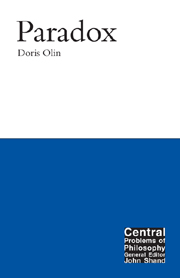Book contents
Appendix
Summary
Here are some further paradoxes. Some are versions of paradoxes already considered; others are unrelated to what has gone before.
The racetrack paradox
Suppose Achilles is trying to break the record for the 100m dash. Not only will he not succeed, but he will not even finish the course. To complete the course, he first has to run half the track, or 50m; then he has to complete half the remaining distance, or 25m; then he has to complete half the remaining distance, or 12½m; and so on. First he is half-way there, then three-quarters of the way, then seven-eighths of the way. But however many of these segments of the track he completes, there will always be some distance left to the finish line. Thus, Achilles will never complete the course.
The racetrack, and the Achilles and the tortoise paradox from Chapter 1, are two of the paradoxes attributed to Zeno of Elea (c. 470bc). See W. Salmon, Zeno's Paradoxes (Indianapolis: Bobbs-Merrill, 1970).
Grelling's paradox
Some words, it seems, apply to themselves. For instance, the word “short” is short and the word “polysyllabic” is polysyllabic. Words that have this feature are called “autological”. Many words, however, do not apply to themselves. The word “long” is not long and the word “monosyllabic” is not monosyllabic. Call such words “heterological”.
Is “heterological” heterological? If it is, then it does not apply to itself, and is thus not heterological.
- Type
- Chapter
- Information
- Paradox , pp. 191 - 198Publisher: Acumen PublishingPrint publication year: 2002



